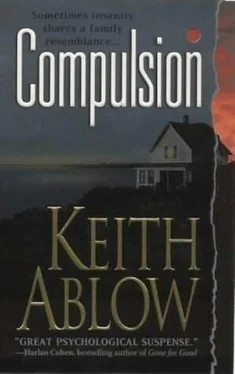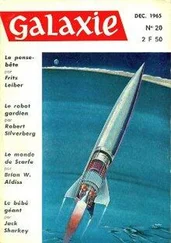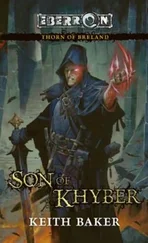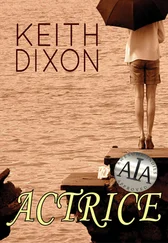"I don't think you'll get a conviction with the information you have," I said. "Garret might actually make that easier. If he tells us anything, it might cut against Billy, not for him. I have no idea."
"We'll get a conviction," O'Donnell said. "Billy Bishop will do life. Mark my words."
"Any decent defense lawyer is going to depose me and figure out I have doubts about Billy's guilt," I said. "The jury will hear those doubts. Let me address them now and get them out of the way."
"Mark Herman from the Public Defender's office has been court-appointed to defend Billy," O'Donnell said. "I'm sure he'll be in touch with you. He's a good man. The Bishops aren't retaining private counsel."
I didn't know Mark Herman, but O'Donnell's tone of voice made me wonder whether it was possible Herman was in the bag, too. Maybe he wouldn't press for an acquittal. Maybe he'd try to convince Billy to plead to a lesser offense, like second-degree murder. I exchanged a look with Anderson that conveyed my cynicism. It was obvious to me that we weren't ever going to get anywhere with O'Donnell. I decided to burn the bridge. "I actually have a great deal of sympathy for people like you," I said.
"Is that so, Doctor?" O'Donnell said.
"It's harder to see a sociopath when he's wearing a uniform," I said. "But I know you must have gone through something terrible that ruined you. Nothing comes out of nowhere."
"I guess we're done with our meeting," O'Donnell said.
"The only question left is what that something was," I said.
He stood up.
"What was it? What was so hurtful in your life that the badge hasn't been enough to help you turn your hatred around?"
O'Donnell walked out of the office. "See yourselves out," he called back to us.
The rest of the day felt like running into wall after wall in an endless maze. Anderson 's meeting with Mayor Keene went down pretty much the way he had thought it would. Keene handed him a copy of the photograph of him and Julia embracing by water's edge, then handed him a three-month suspension, without pay, for inappropriate conduct.
Anderson and I tried driving to the Bishop estate to see if we might stumble on Garret again, but were intercepted by State Police vehicles and turned back.
I called Julia Bishop at MGH to ask her to intervene and arrange a meeting with Garret, but she hung up on me before I could say three words.
Finally, I contacted Carl Rossetti to see if he could get a court order allowing Garret's interview with Julia's consent. He went to the trouble of finding Julia at MGH and getting her written permission, but then learned that Darwin Bishop's team of lawyers had already gotten a preemptive order from the court prohibiting any access to Billy or Garret unless both parents allowed it.
I had to admit things were looking worse for Billy. It felt as if a particular version of the facts was congealing around him, casting him permanently and inescapably as the killer in a drama that would not yield, even to the truth.
North Anderson and I decided to weigh our options over coffee at Brotherhood of Thieves, a favorite haunt of his. We settled on going to the media with the information we had, hoping to bring enough facts to light that Billy would go to court still enjoying a shadow of a doubt as to his guilt. If we were quickly and wildly successful getting our message out, the D.A.'s office might even start worrying about their prospects for a conviction and wait a while before asking a grand jury to indict. That would buy us more time. In any case, I was almost certain Carl Rossetti would agree to represent Billy-pro bono, if necessary. The exposure would pay him back a hundred times over.
The strategy was anything but surefire. Anderson had left his badge with the mayor. That meant I was officially off the case, too. O'Donnell would probably try painting us as exiled, disgruntled former members of his team. And that might be enough to keep our version of the evidence largely out of print and off the airwaves. These days, maverick reporters are as few and far between as maverick investment bankers.
We were waiting for the check when my cell phone rang. The number on the display was for MGH. I thought it might be Julia, apologizing for hanging up. I felt a little uncomfortable answering the call with North at the table, but I didn't want to miss any important news.
Anderson intuited the reason I was hesitating. No doubt Julia was still on his mind a good deal of the time. "If it's her, go ahead," he said. "I'll take a walk, if you want."
"Stay." I picked up. "Frank," I said.
"Frank, it's John." John Karlstein. His voice sounded more solemn than I'd ever heard it.
The background noise in the restaurant seemed to disappear. I could feel, even hear, my galloping heart. Tess was dead, I told myself. I stared at North Anderson, not looking at him as much as looking for him. For more ballast. I felt I had sailed too far into the storm. After bearing witness to Trevor Lucas's butchery, I had barely pieced my psyche back together. Failing to prevent the murder of Julia's baby felt like it might snap the mast of my life once and for all, leaving me adrift forever. That had always been the risk in taking this case. I had spoken the fear to Justine Franza, the Brazilian journalist I'd met at Cafe Positano, who had seen so much beauty in my Bradford Johnson painting of men from one ship trying to save another at risk. What if both ships end up sinking?
Anderson gave me a reassuring nod of his head.
"You there, Frank?" Karlstein asked.
When people use your name while talking to you-especially when they use it two times in as many sentences- it is because they feel the need to reach out to you, to take care of you. "Bad news," I said.
"Afraid so," he said. "This really came out of left field."
I closed my eyes. "Tell me."
"Julia's been hurt," he said.
My eyes opened to a squint. "Julia? What happened to her?"
Anderson looked at me, a lover's worry in his eyes. "Jesus Christ," he said. "Is she all right?"
I looked down, listening to Karlstein. Guilt clawed at my insides. I had left Julia alone, in harm's way.
"Keep in mind, I'm getting this secondhand," he was saying. "I wasn't on the Telemetry floor when the whole thing went down. Long and short of it, her husband came back. I guess he wanted her to sign legal papers of some kind. She did the right thing-reminded him there was a restraining order against him and asked him to leave. He wouldn't budge, so she asked one of the nurses to call the police."
"And…" I said.
"And then he just lost it," Karlstein said. "It took a bunch of staff to drag him off her."
I looked at North. " Darwin beat her up."
"That fucking bastard," Anderson said.
I had a sinking feeling that Karlstein was letting me down easy. "She made it, though? I mean, she's alive?"
"Yes. Yes," he said. "Of course."
"How bad off is she?" I asked.
"She's stable," Karlstein said, "but she took some serious punishment. There's a good deal of facial swelling from a fractured zygomatic arch. She's also got four broken ribs and a liver laceration. I put her in the ICU, just to be cautious. Grabbed a CAT scan of her head, which came back normal. I'll order a repeat before she leaves here, make sure she hasn't started to bleed intracranially. Ophthalmology came by to check out her eye; the right one is swollen shut. Doesn't look like there's any retinal damage." He paused. "She'll heal up, physically. Emotionally, it's got to be a longer mile."
"Is she with it?" I asked.
"I put her on a fair amount of Darvocet, so she's drifting in and out. But when she's awake, she's holding her own. She's completely oriented. She knows who I am, what day it is, where she is, who the president is-all those questions you guys throw at people."
Читать дальше












